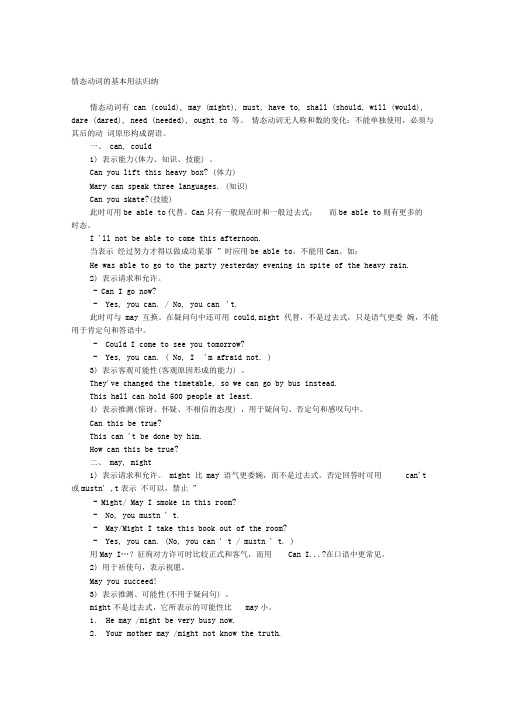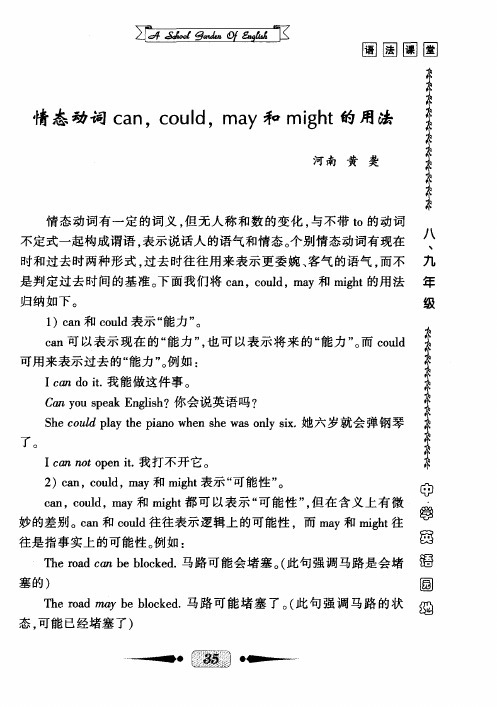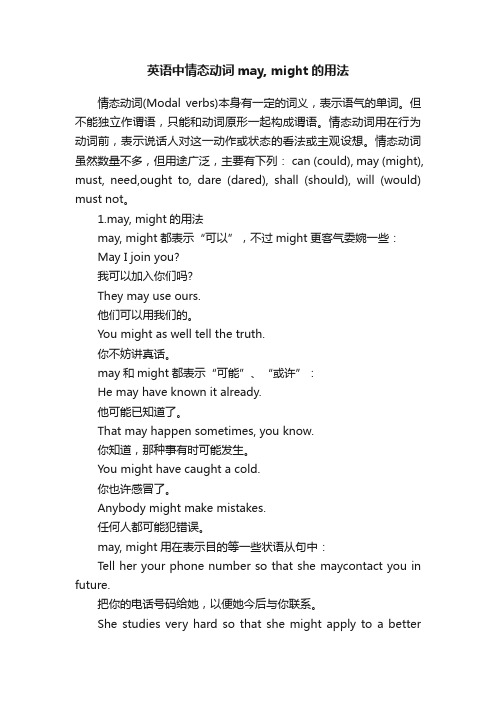情态动词can(could),may(might)的用法
(完整版)情态动词的基本用法归纳

情态动词的基本用法归纳情态动词有can (could), may (might), must, have to, shall (should, will (would), dare (dared), need (needed), ought to 等。
情态动词无人称和数的变化;不能单独使用,必须与其后的动词原形构成谓语。
一、can, could1)表示能力(体力、知识、技能) 。
Can you lift this heavy box? (体力)Mary can speak three languages. (知识)Can you skate?(技能)此时可用be able to代替。
Can只有一般现在时和一般过去式;而be able to则有更多的时态。
I 'll not be able to come this afternoon.当表示经过努力才得以做成功某事”时应用be able to,不能用Can。
如:He was able to go to the party yesterday evening in spite of the heavy rain.2)表示请求和允许。
- Can I go now?- Yes, you can. / No, you can 't.此时可与may 互换。
在疑问句中还可用could,might 代替,不是过去式,只是语气更委婉,不能用于肯定句和答语中。
- Could I come to see you tomorrow?- Yes, you can. ( No, I 'm afraid not. )3)表示客观可能性(客观原因形成的能力) 。
They've changed the timetable, so we can go by bus instead.This hall can hold 500 people at least.4)表示推测(惊讶、怀疑、不相信的态度) ,用于疑问句、否定句和感叹句中。
情态动词表推测的用法

情态动词表推测的用法表示推测的情态动词有must, could, may, might, can, should等。
“情态动词+不定式一般式” 表示对现在或将来的推测,“情态动词+不定式进行式”表示对正在进行的动作或事情的推测,“情态动词+不定式完成式”表示对过去的推测。
一、must表示推测的用法must表示推测时,只用于肯定句,表示很大的可能性,意为“一定,准是,必然会”。
其否定形式是can’t/couldn’t (不可能)。
例如:1. You haven’t eaten anything since this morning; you must be hungry.2. That can’t be Mary —she’s in hospital.二、can/could表示推测的用法1. can表示推测时,多用于肯定句和疑问句。
当用于肯定句时,指“有时可能会”,是理论上的可能,其时间意义宽泛不具体。
例如:Even experienced teachers can make mistakes.2. could表示推测时,既可以用于肯定句,又可以用于疑问句。
例如:My book has disappeared. Who could have taken it?3. can’t/couldn’t表示推测时,用于否定句,是语气最强的否定推测,意为“不可能,一定不(是)”。
例如:He can’t/couldn’t have seen her there.4. can/could在疑问句中表示推测时,含有怀疑或疑问的意味,could比can更不确定。
例如:① Can the news be true?② Who can it be?三、may / might表示推测的用法1. may / might表示推测时,用于肯定句,表示无把握的推测,意为“可能,或许”。
(might 比may 更加不肯定,更无把握)。
情态动词的用法区别学会区分情态动词的不同用法

情态动词的用法区别学会区分情态动词的不同用法情态动词的用法区别情态动词是一类特殊的动词,用来表示说话人对某种动作或状态的态度、愿望、能力或推测等情态,在句子中起到限制、修饰其他动词或表达说话人的意愿的作用。
在英语中,常见的情态动词包括can、could、may、might、shall、should、will、would、must等。
理解和正确运用情态动词,对于学习英语的学生来说非常重要。
本文将从情态动词的用法区别展开讨论,帮助读者更好地掌握这一语法知识。
一、表示能力和许可的区别1. can与could的区别can和could都表示能力,但在用法上有一些区别。
can用于一般现在时,表示现在或将来的某种能力,而could则用于一般过去时,表示过去的能力。
例如:He can speak English fluently.(他能说流利的英语。
)He could swim when he was young.(他小时候会游泳。
)此外,could还可用于表示一种委婉的请求或许可。
例如:Could you please pass me the salt?(请你把盐递给我好吗?)2. may与might的区别may与might都表示许可,但may更常用于正式场合,might更常用于非正式场合,且might更加委婉。
例如:May I use your computer?(我可以用你的电脑吗?)Might I borrow your pen? (我能借你的笔用一下吗?)二、表示推测和可能性的区别1. must与may的区别must和may都用于表示推测和可能性,但语气上有一定的差异。
must表示说话人的推测非常肯定,有把握,而may则表示说话人的推测不那么肯定。
例如:She must be tired because she worked all day.(她一定很累,因为整天都在工作。
)She may be tired because she worked all day.(她可能很累,因为整天都在工作。
情态动词must,can/could,may/might的用法

语
尺
非
注意 : 在表 示 对现 在事 实 的推 测 时 , ut m s 的语 气最 肯 定 。mih 和 cud并 不 表示 过去 时 , gt ol 只表 示语气 较 为委婉 或 可能性 小 于 ma y和 cn a。 在表示 对 过去事 实 的推测 时 .m sc udmi t 动词 原形 ” 示从 过 去某 时对 过去 事 实 的 “ ut o l g + / / h 表 推测 。 用于 间接 引语或 其他 表示 过 去时态 的 主从 句 中。“ ut ym g t a /o l+ ae  ̄ 去分 m s ma/ ih ene ud h v+ / / 词” 示从 现 在对 过去 事 实 的推测 。 u t 气 最 肯定 。 于肯 定句 中 。 否 定句 中应用 cnt 表 m s语 用 在 a ’或 c ud ' m ym gt 般 用于肯 定 句 ,a c ud一 般用 于疑 问句 中。mi t 0 ln a/ i 一 t h cn o l / g 的可能 性最 弱 。 h
中 英 之 .中上 f⑨ 学 语 友高 .甸 4
用 法
定 累 了 吧
例 句
Y um s b rda e uhaln a . 走 了这 么 t s o k
一
mu t ymih/a /o l+ s ma / g t nc ud Hemu t n w sv rl oeg a g a e . 一 定 懂 好 几 门外 语 。 / c s o e ea rin ln u g s 他 k f
◎
2 7
◎
的 D n or . o l aejs frotnt h n . o ’w r Hec udh v togt p o e t y u e o 推 mu t ymih c nc ud 担 心 . 可 能 只是 忘 了打 电话 s ma / g t a /o l+ 别 / / 他
情态动词can,could,may和might的用法

笠
H yb eof e 他 可 能在 办公 室 。 ema ei t fc. nh i
级
在 表示 “ 可 能” , 常用 c n 而不 用 m yn t 如 : 不 时 也 a’ t a o。例 IS e 'o kn w, ecnt ei sh o. 经 十点 了 ,他不 可 能 t no lc o h a 'b n c o1 已 ’t c 在 学校 。
C nyusekE g s?你会 说英 语 吗? a o pa nlh i
S e o l lytepa ow e h a nys . 六岁 就会 弹 钢琴 h udpa i h ns ew sol i 她 c h n x
了。
I a, o p ni 我 打不开 它 。 /n t e . c/ o t 2 a , o l, y和 mi t 示 “ )cn cud ma g 表 h 可能 性 ” 。
更有 礼 貌 。其 中 c n较 多地 用 于 疑 问句 和 否定 句 中 ,而 c ud在 表 示 a ol “ 能” 可 的推测 时 , 口气 上 比 Cl婉 转 。 如 : 在 a l 例
一
Tl ’ n t n . oeC/ i b ?那 个不 是 我 的 , 可 能是 谁 的 I t o mie Wh s Ott e as 它
0
学 圜
回 固
T era a ebok d 马 路可 能 会堵 塞 。 此 句强 调 马路 是 会 堵 晤 h dc nb l e . o c (
T era a ebokd 马 路 可 能 堵 塞 了 。此 句 强 调 马路 的 状 h odm yb lce. (
态 . 能 已经堵 塞 了 ) 可
I d nt k o o ' n w.Bu e c u d ' b n ca s o m.T e ca so m s t h o l nt e i l s r o h l s r o i
情态动词表示“推测”的用法

情态动词表示“推测”的用法英语中,情态动词can / could, may / might, must / can, would / should 等都可以表示“推测”。
具体用法如下:1. can 和couldcan 表示推测时,可能性比较大,用于疑问句或否定句中,不用于肯定句中,意思是“不可能”。
表示一种有把握的推测。
表示否定时,can’t语气最强。
如:It can’t be Mr Li. He has gone to Nanjing already.They can’t know the answer. Let me explain it to them.That can’t be her husband. She is still single.could 表示推测时,可以用于否定句,也可以用在后面跟不定式一般式的肯定句。
表示可能性不大的推测。
意思相当于may / might。
如:Anything could happen if you do not obey the rule.It could be true. But I still doubt it.2. may和mightmay / might 表示一种“可能性很小”的推测。
多用在肯定句或否定句中,might 用在疑问句中表示“可能”,语气最弱。
如:My English teacher may be correcting our exercises in her office.My sister may not be in her room at this moment.The scientists might be discussing the pollution problem.3. must 和can在表示推测的情态动词中,must 的把握最大,意思为“一定,肯定”。
表示对一般情况的推测。
如:Your sister must be a doctor, isn’t she?The boys must be playing football on the playground, aren’t they?Li Ping must be punished by his father.(以上几句要注意其反意疑问句的构成)can的推测用法:在肯定句中can 可以表示客观的(理论的)可能性,并不涉及具体某事是否会发生,此用法常常可以说明人或事物的特征。
英语中情态动词may,might的用法

英语中情态动词may, might的用法情态动词(Modal verbs)本身有一定的词义,表示语气的单词。
但不能独立作谓语,只能和动词原形一起构成谓语。
情态动词用在行为动词前,表示说话人对这一动作或状态的看法或主观设想。
情态动词虽然数量不多,但用途广泛,主要有下列: can (could), may (might), must, need,ought to, dare (dared), shall (should), will (would) must not。
1.may, might的用法may, might都表示“可以”,不过might更客气委婉一些:May I join you?我可以加入你们吗?They may use ours.他们可以用我们的。
You might as well tell the truth.你不妨讲真话。
may和might都表示“可能”、“或许”:He may have known it already.他可能已知道了。
That may happen sometimes, you know.你知道,那种事有时可能发生。
You might have caught a cold.你也许感冒了。
Anybody might make mistakes.任何人都可能犯错误。
may, might用在表示目的等一些状语从句中:Tell her your phone number so that she maycontact you in future.把你的电话号码给她,以便她今后与你联系。
She studies very hard so that she might apply to a bettercollege.她学习很用功,以便能报考一所较好的大学。
本文作者:丹丹英语(公众号:英语语法学习)。
情态动词

情态动词情态动词有can(could),may(might),must(must),haveto,shall(should),will(would),need(need),dare(dared),ought to.△情态动词无人称和数的变化,不能独立使用。
它与其后的动词原形构成谓语。
用法如下:一、can和could的用法1、表示能力或客观可能性,还可以表示请求和允许。
Eg:Can I go now? Yes,you can.Eg:Man cannot live without air.【注】①could也可表示请求,语气较委婉,主要用于疑问句,不可用于肯定句,答语应用can回答。
Eg:Could I come to see you tomorrow?Yes,you can.(否定答语可用:No,I’m afrid not.)②can表示能力时,还可以用be able to代替Eg:I’ll not be able to come this afternoon.但当我们要表示“某件事已成功”时,应用“was(were) able to”而不能用could. Eg:He was able to go to the party yesterday evening and he enjoyed himself very much.2、表示惊异、怀疑、不相信的态度。
(主要用于否定句、疑问句或感叹句中)Eg:This cannot be done by him.Eg:How can you be so careless.Eg:Can this be ture?二、may和might的用法1、表示允许(1) 请求别人允许自己做某事,might 表示的语气较委婉,否定回答用can’t 或mustn’t,表示“不可以”“禁止”“阻止”-May I take this book out?-Yes,you can./No you mustn’t.(can’t)(2)自己允许别人做某事,通常要用may而不用might:You may leave whenever you please. 你高兴随时可以走。
- 1、下载文档前请自行甄别文档内容的完整性,平台不提供额外的编辑、内容补充、找答案等附加服务。
- 2、"仅部分预览"的文档,不可在线预览部分如存在完整性等问题,可反馈申请退款(可完整预览的文档不适用该条件!)。
- 3、如文档侵犯您的权益,请联系客服反馈,我们会尽快为您处理(人工客服工作时间:9:00-18:30)。
情态动词can(could),may(might)的用法(一)can和could的用法1.表示能力或客观可能性,还可以表示请求和允许。
如:Can you finish this work tonight?你今晚能完成这项工作吗?Can you finish the work in such a short time你能在那么短的时间内完成这项工作吗?Man can not live without air.人离了空气不能活。
What can you do?你能干点什么呢?Can you pass me the books?你能给我递一下书吗?Could you help me,please?请问,你能帮助我吗?— Can I go now? — Yes,you can.—我现在可以走了吗?—你可以。
注意:①could也可表示请求,语气委婉,主要用于疑问句,不可用于肯定句,答语应用can(即could不能用于现在时态的简略答语中)。
如:Could I come to see you tomorrow?我明天能来看您吗?Yes,you can. (否定答语可用No,I'm afraid not.)是的,你可以。
(不,恐怕不行。
)②can表示能力时,还可用be able to代替。
如:I'll not be able to come this afternoon.我今下午不能来。
can 和could 只能用于现在式和过去式两种时态,将来时态用be able to 来表示。
He could help us at all.他完全可以帮助我们。
With the teacher's help,I shall be able to speak English correctly.由于老师的帮助,我将能准确地讲英语。
2. “can”表达推测例:Can the news be true? 这消息会是真的吗?The news can't be true. 这消息不会是真的吧。
解说“can”表达推测通常是用在疑问句和否定句。
3.表示惊异、怀疑、不相信的态度。
(主要用在否定句、疑问句或惊叹句中,表示惊讶,不相信等)Can this be true?这可能是真的吗?How can you be so careless!你怎么能这么粗心!This can not be done by him.这不可能是他做的。
4.“can(could) + have + 过去分词”He could have gone home.他可能已回家了。
【注】could后接动词的完成式,除表示对过去的推测外,还有以下用法(不用can):①某事本来可以发生,却没发生He could have told her, but he didn’t choose to.他本来可以告诉她的,但他却没有。
②用来委婉地责备某人过去应该做某事而没有去做:You could have helped me why did you just sit and watch?你本可帮助我的,为什么只坐在一旁瞧着?③表示“差点儿就要”:I was so angry I could have killed him.我是那样生气,差点把他杀了。
疑问或否定形式表示对过去发生的行为怀疑或不肯定。
如:He can not have been to that town.他不可能去过那个镇。
Can he have got the book?他可能拥有这本书吗?5.can not…too\enough表示"无论怎样……也不过分","越……越好"You cannot be too careful when you drive a car.I cannot thank you enough for your great kindness. 对你的盛情美意我感激不尽。
(二)may和might的用法1.表示许可。
表示请求、允许时,might比may的语气更委婉一些,否定回答时(口语中常用)no,you can't . or,yes,please 用mustn't表示“不可以”、“禁止”、“阻止”之意(具有强烈禁止的意思)如:I‘d like to have a smoke here if I may .如果可以的话我想在这儿抽一支烟。
The librarian told her that she might return the book to the library in three days .图书馆理员告诉她说,她可以在三天后还那本书You may drive the car.你可以开这辆车。
— Might I use your pen? — No,you mustn't.—我可以用你的钢笔吗?—不,绝对不行。
用May I ... 征询对方许可在文体上比较正式,在口气上比较客气。
在日常口语中,用Can I ... 征询对方意见在现代口语中更为常见。
You may take the book home.你可以把书带回家去.May I come in?我可以进来吗?May I use your dictionary?我可以用你的词典吗?You may put on more clothes.你可以多穿点衣服.He said he might lend us some money.他说他可以借给我们一些钱。
may 否定式为may not,缩写形式是mayn't.might 是may 的过去式,有两种用法,一种表示过去式,一种表示虚拟语气,使语气更加委婉,客气或对可能性的怀疑。
He told me he might be here on time.他说他能按时间来。
Might I borrow some money now.我可以借点钱吗?2.用于祈使句中表示祝愿。
如:May you succeed!祝你成功!3.表示推测、可能(疑问句不能用于此意)。
I may be busy from tomorrow on .从明天起我可能会忙起来。
You may catch sight of the sunrise from here when you get up before 5 in the morning .你在早晨五点钟以前起来,或许能从这儿看到日出。
She thought it might be wise to try her luck here .她认为在这儿碰碰运气也不错。
He might be alive.他可能还活着。
4.“may(might) + have + 过去分词”表示对过去发生的行为的推测。
如:He may not have finished the work.他可能没有完成工作。
(三)Can和may的共同特征“情态动词”是用于表示说话人的语气和情态的助动词,常表示命令、请求、拒绝、义务、可能需要等。
can和may都具有情态动词的共同特征:①情态动词不同于实义动词,不可单独作谓语,只有跟实义动词连用才有意义。
如:我们应该说I can play chess.而不能说I can chess.应该说You may go. (你可以走了)而不能说You may .②情态动词没有人称和数的变化。
如:I/We/You/He/She/they can speak English.I/We/You/He/She/they may come .③情态动词后的动词必须用原形。
如:我们应该说He can play chess.而不能说He can plays chess.应该说It may rain. (可能要下雨)而不能说It mays rain.(四)Can和may的相似处1.善于推测。
can,may可用来表示猜测、怀疑或不肯定。
不过此时在运用中要注意,can不能用于肯定句,may不能用于疑问句。
(can不肯,may不疑)如:—Where can our teacher be?(这里不能用may代替)我们的老师可能会在哪儿?She may be in her office. (这里不能用can代替)也许在她的办公室里。
2. 谦虚。
can,may都可表示“准许、请求,许可”,此时两兄弟同义,可以互换使用。
不过在这方面用may比用can好一些,因为在表示“请求”时,may表现的更谦虚,更委婉一些。
如:You can/may go home with your mother now. 现在你可以和妈妈一块回家了。
(五)Can与may的区别虽说两者有相似之处,但他们的个性还是非常鲜明的:1.能力超群,刚性十足的can,在表示能力,意为“能、会”方面,还是有很强的实力的。
如:Can you play the guitar?你会弹吉它吗?Yes,I can. 是,我会/No,I can’t. 不,我不会。
2.感情细腻,亲情十足的may,在表示希望、祈求、祝愿,常译为“祝愿”方面,给人无比的温馨。
如:May you be happy!祝你幸福!May the friendship between us last long. 祝愿我们的友情天长地久。
练习1. The light in the office is still on. Mr. White ____be in.A. mustB. mayC. can2. You_______go and ask Meimei.She________know the answer.A. must;canB. must;mayC. need;canD. can;may3. Look out!The knife is very sharp.You________cut your finger.A. needB. mustC. shouldD. may4. I thought you ____ like something to read. So I have brought you some books.A. oughtB. mightC. couldD. must5. –That man must be Sarah`s husband.--No, he ____ be her husband. She is still single.A. can`tB. mustn`tC. may notD. ought to6. Peter ____ come with us tonight, but he isn`t very sure.A. mustB. mayC. canD. will7. –I saw Mary in the library yesterday.--You her. She is still abroad.A. mustn`t seeB. can`t have seenC. mustn`t have seenD. couldn`t see作业1.______ you paint? No, I _______.2. You ________ go to the cinema this evening.3. Lucy isn't here, she _______ be ill in hospital.4.A: Where is my little cat ?B: _______ it be in your room?A: No. it isn’t there.5.______ you have a good time.6. –Could I borrow your dictionary?--Yes, of course you ____ .7. She doesn`t answer the bell. She ____ be asleep.8. Nobody saw her at the meeting yesterday, she_______ have spoken at the meeting9. –My goodness. I just missed the train.--That`s too bad. I am sure you _____ have caught it, if you had hurried.。
